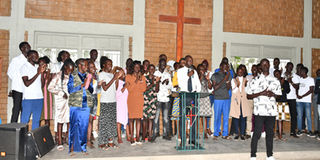High costs bar refugees from Ugandan varsities

What you need to know:
Policymakers are urged to address the loopholes in the sector.
Refugees are struggling to join and attend institutions of higher learning in Uganda due to high costs, among other factors.
According to officials at Makerere, Gulu, and Bugema universities and Islamic University in Uganda (IUIU, it is even difficult to know how many refugees attend their institutions.
The officials made the statements during a recent meeting on access to higher education for refugee students. The meeting was held by the Uganda Refugee Law Project last week.
Mr Leonard Richard Buweno, the Academic Registrar of Bugema University, last Friday said: “There is a lot of stigma that these refugee students go through and many conceal their status due to fear of being stigmatised. Then language is a barrier, especially for the Congolese, Burundian students with French backgrounds.”
He said the university recently introduced a one-year certificate of proficiency in English, But he said some of the learners do not complete their studies due to mainly financial constraints.
Mr Alfred Tingo, the registrar of Makerere University’s College of Engineering on Tuesday said: “We don’t know how many students apply as refugees. We have not created a platform to detect that these applicants are refugees, and it is one big problem Makerere has.”
Prof David Okello Owiny, Gulu University’s deputy vice-chancellor in charge of academic affairs, said the institution does not have any data on refugee students.
“What we look at is their qualifications for admission to the university and they study without any problem,” he said.
Prof Owiny said the university has refugee students numbering more than 200 but many of them do not want to show up or want to be identified as refugees.
He, however, said the university management is encouraging such students to “form associations through which we can have information and log about them and see how to help them when there is need.
Dr Jamil Serwanga, the vice-rector for academic affairs at IUIU, last week called for joint research by universities on refugees, who are about 1.5 million in Uganda
“We need how we are managing refugee-related issues to inform policy actions,” he said.
Dr Serwanga said IUIU has a population of 247 students registered in the refugee category from three countries namely, Somalia, Ethiopia and South Sudan across its campuses. These students hold refugee cards, asylum seeker certificates and refugee family attestation certificates.
In February 2023, the University of Edinburg together with the Refugee Law Project of Makerere University, published a Foundations for All Toolkit document which details the barriers hampering refugee learners from accessing affordable education.
Ms Martha Akello, one of the authors, said: “The accreditation of programmes, for instance, tends to be a long process”, which is valid for ensuring academic rigour and quality of the learning experience.” She, however, called for programmes that provide a relatively rapid solution for refugee students.
Despite the hurdles faced by refugee students in accessing higher education in Uganda, Dr Cyrus Ssebugenyi, a Principal Education Officer at, National Council for Higher Education said: “We are in the final year of working with the International Labor Organisation (ILO) to develop an online subsystem which we can be used to verify the qualifications of these refugees. We still have a gap of 100 for them since the target is 400, specifically for Rhino, Nakivale and Mvepi refugee settlements. But many refugees, especially from Eritrea and Ethiopia, do not want their qualifications validated for security reasons.”




